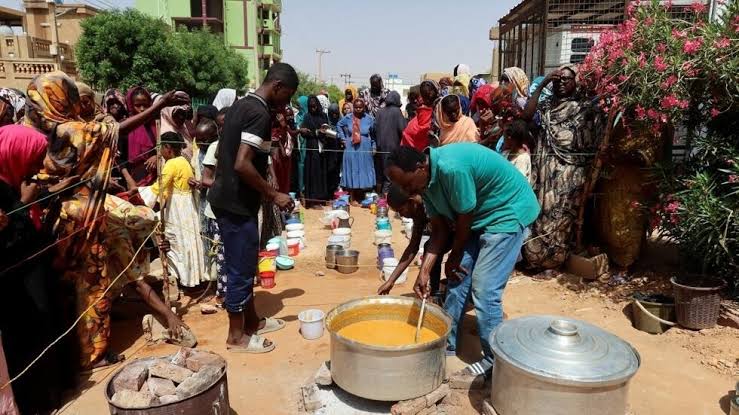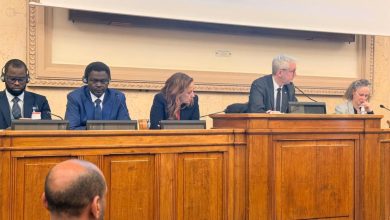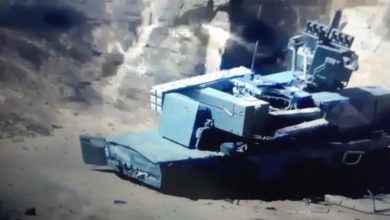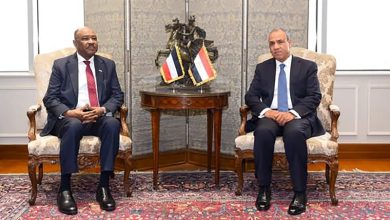“Tekkias”: A Historical Legacy for Combating Sudan’s Crises

Sudan Events – Agencies
With visible exhaustion, Sudanese woman “Zainab” (a pseudonym) speaks of her reliance on the neighborhood tekkia (community kitchen) in Omdurman to feed her nine children.
She told Al Jazeera Net that she hasn’t cooked at home in months because she can’t afford ingredients for meals. So, she visits the tekkia daily to get breakfast and lunch, which prevents her and her children from going hungry.
Tekkias have become a refuge for some residents and displaced people, providing food and medical care. They serve a range of meals like Egyptian beans, lentils, and rice.
In the Omdurman district west of Khartoum, the tekia at “Sheikh Al-Amin Mosque” in Beit Al-Mal, whose residents remained despite the outbreak of war, continues to provide food and medicine as a place of worship, Qur’an memorization, and hospitality.
Sufi Sheikh Al-Amin Omar Al-Amin told Al Jazeera Net that this tekia has been active for over a year, offering three meals and free medical care and prescriptions for around 5,000 people, supported by doctors and pharmacists.
Since its founding as a small corner in 1992, the mosque has had a tekia, though its capacity has grown significantly due to the war. They initially offered meals during Ramadan, and with the growing number of people affected by the conflict, services expanded.
Those managing the tekkias face challenging conditions, especially in areas controlled by the Rapid Support Forces (RSF). Those trapped there suffer from food and medicine shortages, widespread disease, and disrupted communication, electricity, and water services. Rising food prices have forced some tekkias in Khartoum to close, especially in the “South Belt” area.
Emergency Rooms
Previously, the Al-Jereif Emergency Room informed Al Jazeera Net that it supports 18 kitchens, most of which have stopped operating “due to lack of funding and ongoing RSF looting.” This threatens the food security of nearly 7,000 families dependent on the local tekia. Most tekia workers rely on donations from generous contributors.
In northern Omdurman, the tekia “Fakka Req” has emerged as a unique source of support for displaced and war-affected individuals.
Othman Al-Jundi told Al Jazeera Net that this tekia provides food, clothing, and medicine, and supports economically active women by funding and marketing their projects to help lift them out of poverty.
According to Al-Jundi, “Fakka Req” serves over 300 families, averaging five members each, with meals including beans, lentils, rice, and pasta, funded by local and international supporters.
Tekkias are not merely a recent response to war. According to Sheikh Al-Amin Omar, they date back to the arrival of Islam in Sudan through Sufi orders, where each “mosque” was traditionally accompanied by a tekia. They became integral to “religious leaders,” Sufi Sheikhs, and Qur’an memorization centers.
As the army advances, Khartoum State’s Minister of Welfare and Social Development, Sadiq Ferini, notes that tekia numbers are growing alongside their beneficiaries, pushing the state to consider tekias as a model for food assistance.
He told Al Jazeera Net that there are currently seven model tekkias and 314 charity-run ones in the capital, with varying numbers that receive material and financial support from the governor. In his view, the tekia initiative reflects how society has taken the lead over the state in aid efforts.
According to Ferini, tekkias served ready-made meals to 75,000 people last week alone. “Following RSF attacks on villages in eastern Al-Jazira State, the number of tekia users increased by around 10,000, and efforts are underway to register them and meet their needs.”



